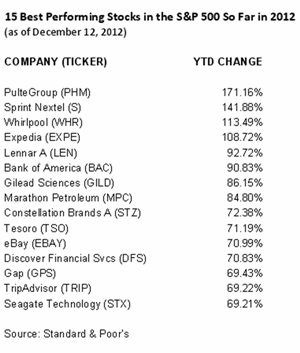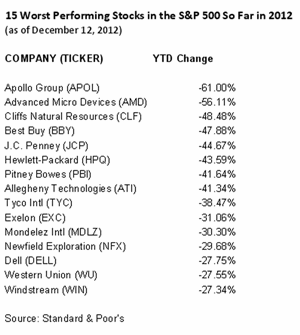The list of outperforming sectors points to more good fortune next year, but it might not be advisable to back up the truck just yet, writes MoneyShow's Howard R. Gold, also of The Independent Agenda.
“All happy families are alike; every unhappy family is unhappy in its own way.”
So wrote Tolstoy in the 19th century. But he could have been talking about the US stock market in 2012.
Why? Because the market’s biggest winners this year—at least in the large-cap S&P 500 index—were often beneficiaries of bigger trends, like the strength of consumer sentiment and housing’s revival.
- Read Howard’s analysis of why housing’s comeback is for real on MoneyShow.com.
But the losers were generally individual companies hit by technological obsolescence or bad management decisions.
Financial and consumer sectors set the pace in what has been a surprisingly good year for US stocks. With gains of 23.6% and 20.9%, respectively, financial and consumer discretionary stocks significantly beat the S&P 500’s strong 12.76% gain for the year through Wednesday’s close. (Energy, materials, and utilities were the biggest laggards.)
Homebuilder PulteGroup (PHM) was the S&P’s biggest winner, rising 171.2% this year, while fellow homebuilder Lennar (LEN) also made the top ten, with a 92.7% rise. Appliance maker Whirlpool (WHR) had soared 113.5% as of Wednesday; it, too, is a big beneficiary of the housing recovery, as were big gainers Sherwin Williams (SHW) and Home Depot (HD).
Then there were companies that prospered from the revival of the consumer—online travel sites Expedia (EXPE) and TripAdvisor (TRIP) and online auction king eBay (EBAY). Financial firms that also rode the consumer wave to big gains included Bank of America (BAC) and Discover Financial Services (DFS).
- Read Howard’s analysis for the biggest winners and losers in politics in 2012 at The Independent Agenda.
(The biggest winners in the broad Russell 3000 index included smaller health-care companies BioDelivery Sciences (BSDI), up 451.5% for the year as of Monday’s close, and Arena Pharmaceuticals (ARNA), up 367.4%, as well as another homebuilder, Hovnanian Enterprises (HOV), which has gained nearly 270% so far in 2012, according to Bespoke Investment Group.)
The S&P 500’s biggest loser was Apollo Group (APOL), the online higher education company that has fallen on hard times. It’s down 61%. Chip maker Advanced Micro Devices (AMD) lost 56.1% of its value amid a fall-off in demand for traditional desktop and notebook computers. (Dell also was a big loser this year.)
JCPenney (JCP) and Best Buy (BBY) were retailers with broken business models; each lost more than 40% through Wednesday’s close (before reports surfaced of a $5 to $6 billion offer for Best Buy from its founder ). Postage meter and mailing system company Pitney Bowes (PBI) and money-transfer service Western Union (WU) were on the wrong side of the technological curve, and their stocks suffered.
|pagebreak|Hewlett-Packard (HPQ), which lost 43.6% of its value in 2012 through Wednesday, is a victim of previous CEO Leo Apotheker’s whopper of a mistake in buying software maker Autonomy Inc. for $11.1 billion. HP wrote off $8.8 billion of that, claiming “serious accounting improprieties,” including “outright misrepresentations.”
Autonomy co-founder Mike Lynch replied, “I utterly reject all allegations of impropriety.” (In a recent column, Mark Hulbert said HP may be a good turnaround candidate.)
So, what does it mean for the coming year?
First of all, it’s clear that investors do not expect a recession next year—fiscal cliff-induced or otherwise.
Stock markets anticipate what the economy will do in six to nine months. So, when the two most economically sensitive sectors—financials and consumer discretionary stocks—are the clear leaders and energy and utilities are the biggest laggards, that’s more typical of the beginning of an economic recovery cycle than of the end.
Second, they believe the housing recovery is finally for real, as the huge gains in homebuilders’ stocks indicate.
That means that if the fiscal cliff issue is successfully resolved, we could be in for a long consumer-driven economic recovery (with an additional boost from corporate spending when the fiscal uncertainty ends), as several stock market bulls I’ve talked to recently have predicted.
- Read why some bulls think we’re on the verge of a new secular bull market on MoneyShow.com.
But finally, the easy gains may have been made in many of these early-cycle stocks.
Homebuilders Lennar and Hovnanian have both risen around 500% from their cyclical lows of March 2009. Retailer Macy’s (M) has soared 578%, Hertz Global Holdings (HTZ) has skyrocketed 926%, and Discover has surged 693.4% since their late 2008-early 2009 troughs. The S&P Consumer Discretionary group as a whole has nearly tripled from the March 2009 bottom.
That may not be the end of these stocks’ run—homebuilders and construction-related stocks could actually have a couple of more good years of gains left in them if housing continues to improve. But I certainly wouldn’t be throwing a lot of money at stocks that have advanced 600% or 900% already.
Active investors will have to look to other areas for outsized gains, and I’ll have more on that in the new year.
Howard R. Gold is editor at large at MoneyShow.com and a columnist for MarketWatch. Follow him on Twitter @howardrgold and catch his coverage of politics, the economy, and the fiscal cliff at www.independentagenda.com.













